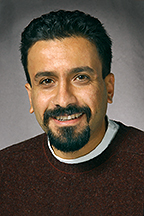To address the high demand for Artificial Intelligence (AI) talent, Waterloo Engineering introduced an AI option last spring that has quickly become a popular choice for undergraduate students.
Through learning about the newest applications and opportunities, students gain the knowledge and hands-on skills that will enhance their careers as industry leaders in the field of AI.
Currently, 50 engineering undergrads are enrolled in the option, well surpassing the original target of 30. It’s anticipated that the number of students pursuing the option will double by next year.
The overwhelming popularity of the AI option — now the top pick of options for engineering students — has meant changes to who is eligible to apply.
Originally open to all engineering students, it is now limited to those in third and fourth-year with an average of at least 80 per cent.

The new requirements make sense, says William Melek, a mechanical and mechatronics engineering professor who is the co-ordinator of the Faculty’s AI option.
“The option includes advanced courses,” he explains. “So even if students attempted to enrol in the option before third year they wouldn’t have the prerequisite courses.”
The option provides students with the fundamentals of AI and allows them to build on to the knowledge they’ve acquired through their engineering discipline.
“For instance, mechatronics engineering students taking the option would be able to take the AI they learned and apply it to the robotics knowledge that they already have to make robots more intelligent when they interact with humans,” says Melek.
New institute brings together AI expertise
Melek points out that the University is taking a leading role in shaping and directing AI technology.
In April of this year, the University launched the Waterloo Artificial Intelligence Institute, which is made up of almost 100 faculty members who are tackling practical and fundamental problems brought to them by partners in business, government and the non-profit sector.
A joint venture of the engineering and mathematics faculties, the institute focuses on fostering campus-wide research into AI.
When Melek joined Waterloo Engineering in 2004, it was mechatronics engineering that was the new hot field of study.
“If you’d asked me then, I would not have guessed that we’d be where we are today. The fields of autonomous systems and AI were basically not on the map,” he says. “But with the new developments in industry and society as a whole, those two fields have started becoming more and more prevalent in the last three to four years.”
Industry’s need for Al expertise continues to grow with estimates suggesting that AI will contribute up to $15.7 trillion a year to the global economy by 2030.
“Intelligent systems, smart cities, advanced robotics, autonomous systems – all of these types of new transformative technologies will have to be developed by engineers,” says Melek. “Industry is currently looking for those types of skill sets in our co-op students as well as our graduates.”